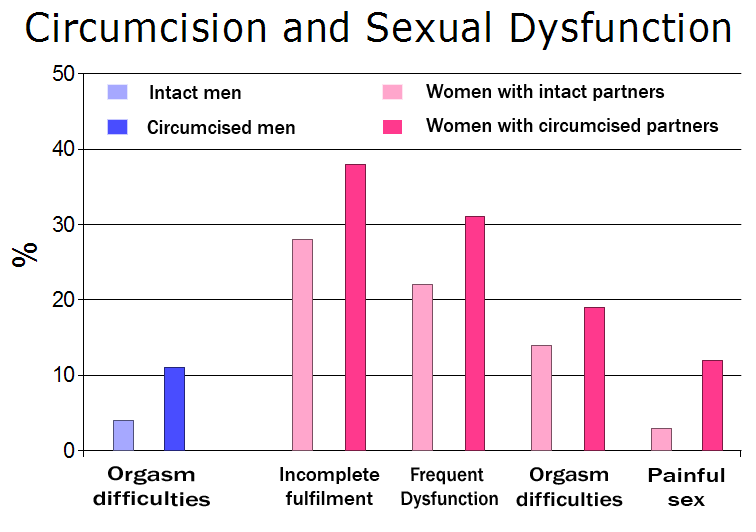|
Post-gazette (Pittsburgh) Its not just about circumcision[Actually, it is.]
By Dr Steven L Jones The citizens of San Francisco will decide in November whether to ban circumcision, a practice that dates from antiquity and is embraced by at least three of the world's major religions. [Three? Islam, Judaism, and ...?] Now, the fact that something stretches far back into human history is by no means a guarantee that it has social value. Slavery, human sacrifice and arranged marriages for adolescents also have long histories, but, thankfully, are no longer accepted by Western societies. The question is whether circumcision belongs on this list. It doesn't. [As an imposition on non-consenting people, it does.] The Centers for Disease Control reports that circumcision has numerous health benefits. Circumcised infants have fewer urinary tract infections, a blessing to any young family already stretched by numerous doctor visits. ["Fewer" is a slippery word. The number of circumcisions required to prevent one UTI is at least 100, probably many more.] International studies from Africa, Asia and the United States also have found that circumcision lowers the likelihood of HIV infection and a host of other sexually transmitted diseases. [Again, "reduces the risk" is meaningless without context, the claim is debatable and of limited applicability - only to female-to-male transmission - and "a host" is an exaggeration.] And the CDC report makes clear that this is not just attributable to behavioral or lifestyle issues that may be correlated with circumcision. The procedure itself results in lower rates of STD infection and may lower the risk for certain types of cancer, too. [None of these is urgent enough to require doing it within days of birth.] Why, then, the proposed ban? [Not a ban, an age-restriction] Advocates claim it is in the best interests of the child. [It is circumcision advocates who say circumcision is in his best interests. Proponents of the age-restriction say he is the best person to determine his own best interests, when he is old enough, and an age-restriction protects his interests until then.] This seems a curious rationale for at least two reasons. First, the health benefits are well documented. There are, of course, risks associated with any surgical procedure, but these are minor. Other than short-term discomfort and bleeding, there are few side effects reported by the CDC. [Well if the CDC doesn't report the finite risk of death, loss of the penis, etc. etc. it's not doing its job] Second, it is surely odd that political advocacy groups would be in a better position to evaluate the best interests of the child than the child's own parents, clergy and, not least of all, doctors. [... but the man he becomes is in a better position to evaluate his own best interests than any of those.] The real issue, then, is what advocates of the ban mean by "best interests." [Insofar as proponents of the age-restriction have ever used that expression, they mean his right to dermine his own best interests.] The root issues are not medical, but political. [Thus writing "ethical" out of the equation.] Lloyd Schofield, proponent of the ban and author of the legislation, has likened circumcision to female genital mutilation, not because the two are medically or culturally similar (they aren't [they are ethically and medically similar, different anatomically and sometimes in severity] ) but because he hopes to stoke outrage by connecting circumcision to the violent manipulations of young girls who have this practice forced upon them. [And Dr Jones knows what Lloyd Schofield really thinks, how?] In his view, circumcision should be a matter of "choice" [Why the scare-quotes? Choice is what it would be] exercised at the age of 18, or later. In San Francisco the issue may be "forced" circumcision [Why the scare-quotes? Forced is what it is] and the supposed limitation on an individual male's future freedom and right to control his own body [Why "supposed"? What else is it?], but this logic has implications for other religious practices, as well. In the minds of the faithful, circumcision is not just an act performed on a given day; it is an initiation into a community and a way of life. And it is not the only such practice. [But the baby is not yet among the "faithful" and may later choose not to be. In fact, some men have been driven away from Judaism by their circumcision.] Faith-based schooling, for example, is designed to instill and nurture faithful observance by religious adherents and is often chosen not by the child but by the parents. [Got that? Male genital cutting is not comparable with female genital cutting, but it is comparable with faith-based schooling. Talk about swallowing a gnat and straining out a camel!] Of course, critics of the practice have argued that religious schools (or religiously motivated home-schooling) may render a child incapable of exercising truly free choice when they come of age. [They have? Reduced their ability to, perhaps, but many people do shake off faith-based education.] How, they wonder, can children who have been indoctrinated from birth with a particular view of the good life actually be free to make their own decisions? While some such concerns may be valid, there are significant legal and sociological problems with this sort of reasoning. [So it's debatable whether adults can shake off faith-based schooling. What's NOT debatable is whether men can shake off circumcision - which is the key point at issue. Jones has just shot down his own analogy.] Legally, the U.S. Supreme Court has recognized that parents have a right, even a duty, to bring up their children to be more than just members of the state. In many of the world's religions, it is a fundamental obligation to raise one's child in the faith. For San Francisco, or any locality, to disallow the exercise of this solemn duty in the name of individual choice is to radically undermine the very sense of obligation and commitment at the heart of religious practice. [See the slippage? Because parents should be free to indoctrinate their children - and he admits that is debatable - they should also be free to cut their (male) children's genitals. He assumes and asserts without logic or evidence that cutting part off genitals is essential to "raising one's childen in the faith".] It is on the sociological level, however, that the problems with San Francisco's proposed ban are most evident. At bottom, advocates of the ban believe they are protecting human rights and freedom. For them, freedom exists only if a person is untied from any sort of binding practice or communal obligation. [No, people can be free to bind themselves to a community and its obligations.] Once something has been done to individuals, rather than by them, they are no longer free. [This is, in general, true - especially where they are things they did not, or would not, choose to have done to themselves.] Thus, things like circumcision, or the decision to restrict exposure to alternative viewpoints in an effort to inculcate a particular set of religious truths, if forced on the child by the parents, renders true freedom impossible. [Again, simple equation of two diverse practices with no analysis of their logical or ethical similarities or dissimilarities.] The problem with this reasoning is both simple and profound. It is simply not who we are. Humans are not free-floating individuals unconnected from the communities that surround them. We are social beings who thrive most when we have thick ties to kindred spirits, when we are nurtured in institutions and relationships that connect us to something larger than ourselves. [Yes, but infant circumcision is perhaps the only case where "connecting us to something larger than ourselves" involves us having part involuntarily cut off our bodies. Nor is it clear how the latter is supposed to effect the former.] Curtailing the rights of parents to initiate those relationships is a social experiment risking dire consequences [Which are?] -- which would be felt not by proponents of the ban, but by the very children they seek to help. [More and more men, including many Jews, are coming forward to complain about having this done to them. Most recently the lead singer of Blood Sweat & Tears. Is Dr Jones suggesting parents or the community would fail to bond with children who had not had parts cut off their bodies? That is not the experience of those parents who have chosen to do just that. So is he suggesting that any resentment parents feel at not being allowed to cut parts off their (male) children will be taken out on those children? That would suggest he has a poor view of human nature.] Dr. Steven L. Jones is associate professor of sociology at Grove City College and a fellow for character and ethics[!] with the college's Center for Vision & Values (sljones@gcc.edu). |
|
SF Weekly Foreskin Activist Glen Callender Talks Circumcision and Performs Astounding Feats With FruitBy Titania Kumeh Everybody loves an incredible dick trick, especially one performed for a political cause. That's just what Glen Callender, the founder of the Canadian Foreskin Awareness Project (CAN-FAP!) presented over San Francisco Pride weekend at Civic Center. In case you missed it, Callender was the guy dressed in a white lab coat guiding groups of UN Plaza passers-by inside his foreskin demonstration booth, a white tent adorned with red and white Canadian flags and a banner declaring "Foreskin is Fabulous!" ... |
|
ForeskinMan.com Foreskin Man #3 outForeskin Man #3 is out, and this time the hooded rescuer flies to Kenya to help Vulva Girl to save two children from husband and wife circumcisers. But Foreskin man is in grave danger.... |
|
YouTube San Francisco Pride Parade 2011: Circumcision Ban, Stop Male Genital MutilationBy kevinsyoza
|
|
Times LIVE (Johannesburg) Initiate flees circumcision campBy Kathryn Kimberley An Initiate escaped what he says was "11 days of hell" by fleeing from a circumcision camp and crawling to a roadside, from where a traffic officer rushed him to Cecilia Makiwane Hospital. Sinethemba Gineto, 23, from Johannesburg, relived the nightmare following his botched circumcision, done against his will. He said he had visited his mom in Mdantsane, Eastern Cape, on June 16 when his uncle and a group of men allegedly "forced" him to undergo circumcision. ['He said...allegedly "forced"' Why three levels of disbelief? Is there any reason to suggest he was willing?] He said prescribed initiation procedures were not followed and [the circumcisor] was not even registered with the Department of Health. Provincial health department spokesman Sizwe Kupelo said situations such as Gineto's were a "huge concern" at this time of the year. In 2009, the Bisho High Court ruled that circumcision without consent was illegal. IOL News, June 29, 2011 He said last week, 200 Bizana initiates were admitted to hospital due to allegedly botched circumcisions. |
South African medical ethics committee agrees infant circumcision unethicalThe National Organisation of Circumcision Information Resource Centres of South Africa (NOCIRC-SA) wrote to the Kwa-Zulu Natal Health Department appealing to them not to proceed with a mass circumcision campaign in February, and sent a copy to the Human Rights, Law & Ethics Committee of the South African Medical Association. The committe has replied as follows: The matter was discussed by the members of the Human Rights, Law & Ethics Committee at their previous meeting and they agreed with the content of the letter by NOCIRC SA. The Committee stated that it was unethical and illegal to perform circumcision on infant boys in this instance. In particular, the Committee expressed serious concern that not enough scientifically-based evidence was available to confirm that circumcisions prevented HIV contraction and that the public at large was influenced by incorrect and misrepresented information. The Committee reiterated its view that it did not support circumcision to prevent HIV transmission." |
|
BBC Debate circumcision ethics callBy John Sudworth
A group of circumcised men is calling on British doctors to debate the ethics of the procedure at the British Medical Association conference this week. NORM-UK is a support group for men who say they have been harmed. It has held its first public demonstration in the UK, lobbying delegates in Cardiff. It wants British doctors to recognise circumcision as major, irreversible surgery that should not be carried out on new-born babies. There are no accurate figures, but an estimated 30,000 boys are circumcised in the UK every year. The majority of them as a result of their parents' religious faith. Islamic, Jewish and some Christian communities circumcise male children as a matter of course. Stop Dr Antony Lempert, a GP and chairman of the British Secular Medical Forum, has submitted a motion to the BMA conference calling for doctors to stop performing "irreversible, clinically unnecessary surgery on the genitalia of non-consenting minors." The medical establishment, including the General Medical Council, refers to the procedure when carried out on children as "Non Therapeutic Circumcision", seemingly recognising that there is little benefit. Some NHS trusts have decided not to carry out circumcisions requested for religious reasons. Some doctors who support the practice have argued that research shows circumcised heterosexual men to have a reduced risk of HIV infection. While Dr Lempert believes that adults should be free to act on this research if they wish, he believes there is no justification for carrying out the procedure on children. "To cut off a functioning part of a boys body for no therapeutic reason, simply because the parents have a particular belief, is anathema to normal medical practice, it's an extraordinary exception," he said. Consequences In addition, Dr Lempert points out, circumcision carries risks; both the immediate danger of haemorrhage and infection, and the long term risk of impaired sexual function. "The available evidence shows that the foreskin contains 20 to 30 thousand nerve endings and has a very important function in lubrication... circumcision gets rid of one of the most sensitive areas of the penis," he said. It is not just here in the UK that campaigners are trying to force the issue into the public domain. Later this year, San Francisco is due to become the first American city to vote on whether to ban circumcision, although Jewish and Muslim groups are challenging the vote as unconstitutional. There are, of course, many men who see circumcision as an important part of their religious and cultural identity and who report no adverse side effects at all. But that is not the point, according to NORM-UK. The group argues that circumcision can have side-effects and they want the medical profession to stop viewing the procedure as minor and inconsequential, not just for children but for adults too. Dan from London, another member of Norm-UK, had his circumcision three years ago, offered as an easy fix for the condition phimosis, a tightening of the foreskin. He says no one told him just how much of an impact it could have on his sex life. "Imagine having your tongue but not being able to taste," he says. "You'd still be able to use your tongue, but if you weren't able to taste certain foods, or taste anything at all, you know, I liken it to that." |
|
Swazi Observer Women want forced circumcisionMKHIWENI Constituency women are advocating for a law that will make it compulsory for men to be circumcised in the country. They say chiefs should be the ones making sure that they law was followed and people who refuse to be circumcised be fined. This matter was raised during a meeting at the constituency where the issue of circumcision was the main issue discussed. The discussions and lectures were organised by the ministry of health ... The women said having all men circumcised would not only help them (men), but the nation at large in that the risks of their wives contracting sexually transmitted diseases would decrease. ...
| ||||||||||




 ]
]